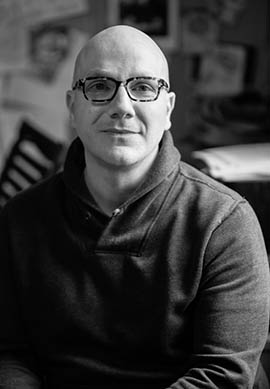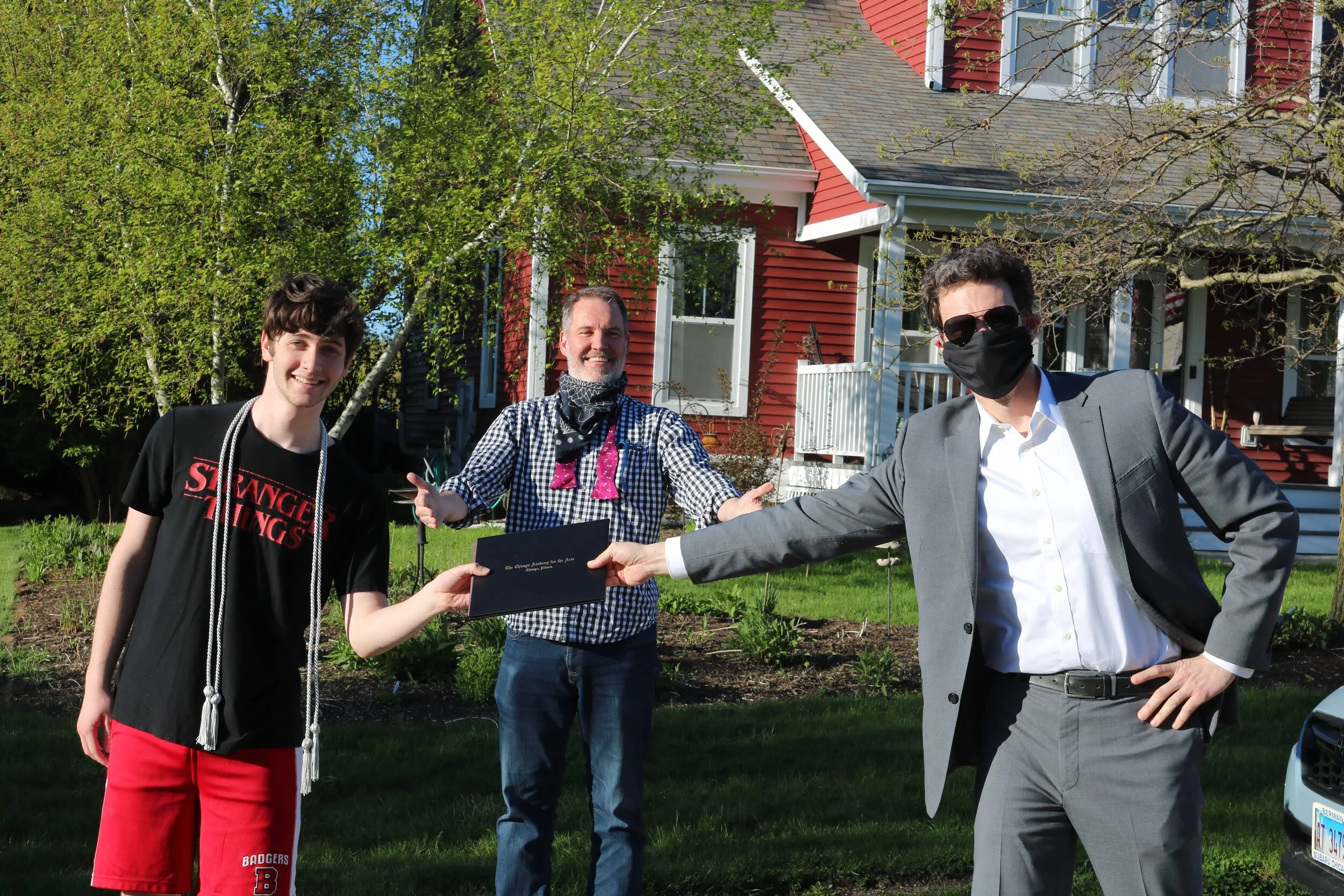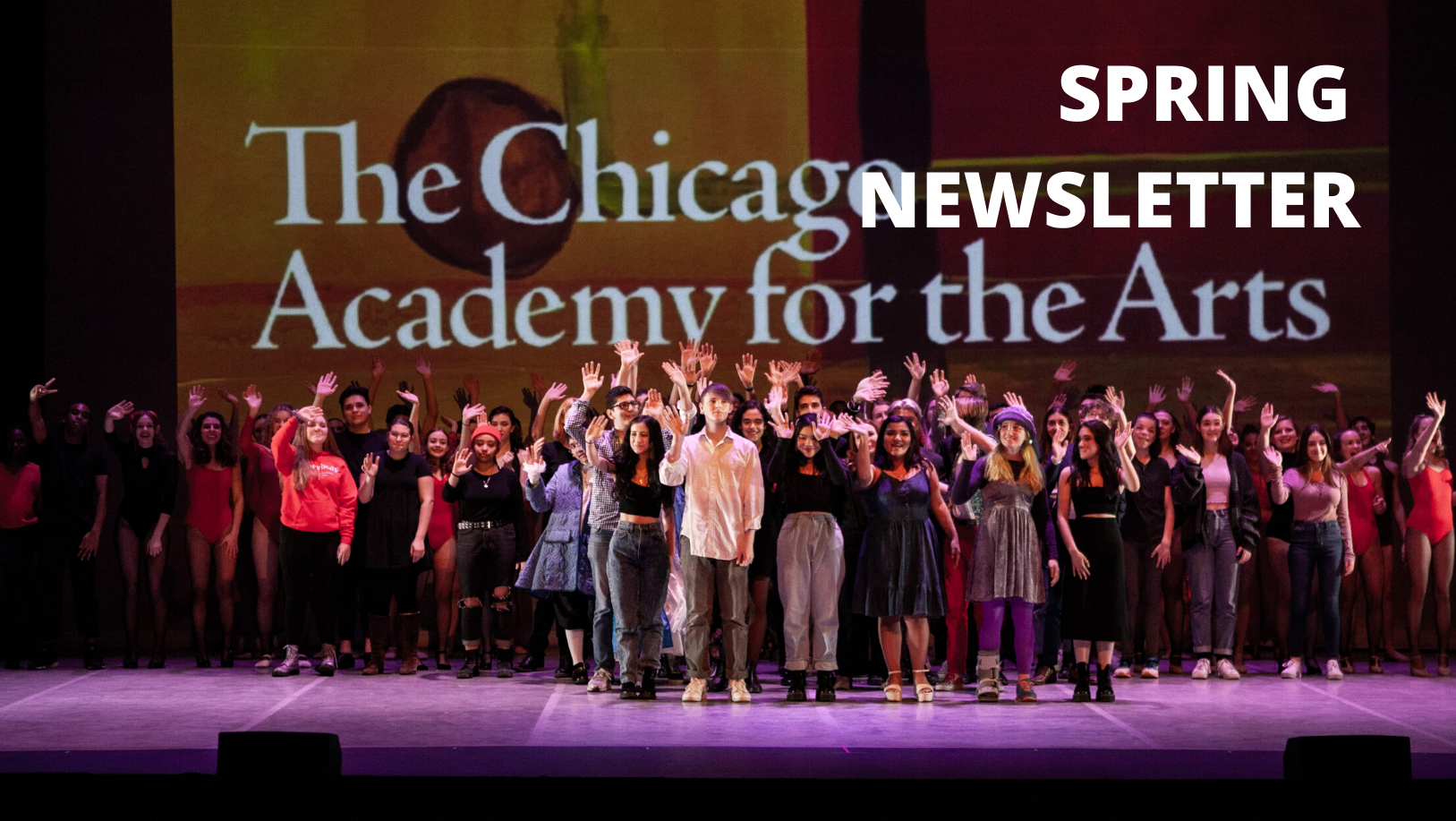The English Department focuses on developing sensitive and critical interpretations of fiction, nonfiction, poetry, and drama through reading, discussion, and writing.
Co-Chair - Humanities
Nicholas Roux teaches philosophy and creative writing. He attended Kenyon College, where he earned a Bachelor of Arts in English, with concentrations in Creative Writing and Humane Studies, and served as a student associate for The Kenyon Review.
Christopher Hagenah attended University of California Santa Barbara, where he earned a Doctor of Philosophy in English.
Natalie Staples earned her Bachelor of Arts in English with a concentration in Creative Writing from Kenyon College and a Master of Fine Arts in Poetry from the University of Oregon, where she also taught Poetry and Composition before coming to the Academy.
As writers and thinkers, students will learn to push past text into subtext, discern reaction from analysis, and develop a pleasure for reading literature with purpose.
Students in the English Department will develop into sensitive and critical readers of fiction, nonfiction, poetry, and drama through reading, writing, and discussion. The curriculum is centered around our what-how-why methodology, which focuses attention to the synthetic relationship between the thematic and formal elements of literature and composition. This design gives students the ability to verbalize pointed responses, compose cogent essays, and interpret literature with confidence.
A small army of faculty began a two-day, 400-mile caravan, stopping at each senior’s home to hand-deliver diplomas and personally applaud each graduate. Congratulations to the Class of 2020!
Students at The Academy will have the opportunity to take English classes ranging from requisite courses like American Literature and Analysis and Composition to electives like Literature and the Comedic Form and Myth and Hero. As seniors, students can be placed in AP English Literature and Composition upon the recommendation of their teachers.
English Department Courses
American Literature is a survey course that introduces students to a range of the best and most seminal works of literature of various forms and genres and from various historical contexts and literary movements in American culture. This course will build upon the methods of literary analysis introduced in Freshman English in order to provide students with the necessary tools for more complex written analysis. Students will develop a deeper understanding of the form-content relationship in order to make cogent arguments about the literature studied.
Analysis and Composition is designed to advance students' skills in The Academy's "what-how-why" methodology by incorporating non-fictive texts to introduce critical themes in two specific literary subjects. Through two quarter long units, Analysis and Composition investigates Justice and Sexual Identity through critical essays, drama, works of fiction, films, and graphic novels to locate salient themes, convergent and divergent understandings, and work towards complex, synthetic interpretations regarding justice, the state, and ethics, as well as sexual discourse and expression.
Postcolonial literature introduces students to the relationship between the “Self” and the “Other” borne from the hegemonic history that indelibly connects Europe and Africa. Specifically, how imperial powers sought to represent the “Other,” and how the power of representation was used to justify and engender the subjugation of peoples and cultures. With the use of critical essays and Victorian and Modern novels, we will examine the complexities of representation and the ways in which literature can serve to either propagate or deconstruct the binaries that dominated colonial attitudes.
Shakespeare as Literature and Drama aims to help students gain an introductory understanding of Shakespeare's work and how it fits into the context of his life and times. Other goals for the course include the following: to learn to write about Shakespeare's work; to learn how to read and analyze Shakespeare’s plays and their significance linguistically, historically, politically, socially, and culturally; to do close readings of text, noting the integration of literary devices and textual directives for performance; and to develop a methodology for approaching antiquated texts for academic reading, pleasure reading, and performance.
Myth and Hero introduces students to mythic stories and heroes from around the world and investigates the underlying psychological need—both culturally and personally—to construct these tales. After a short introduction to mythic and heroic structure, the course examines different heroes from various cultures, drawing connections and shared needs between different peoples and time. More modern works will then be considered with an emphasis on the psychological aspects of heroic tales to understand the overall shift from epic to tragic, perfect to flawed, divine to sublime, and archetypal to individual in the heroic tradition.
Literature and the Comedic Form is designed to investigate central questions about humor while introducing students to numerous facets of comedy in literature. What is laughter? What is funny? How are these two both very different—one physical the other mental—and related? Although the comedic is something experienced on any given day, we rarely stop to rationalize why our bodies are convulsing uncontrollably. Students will explore various conventions in comedy, specifically, the mechanics of jokes, the experience of laughter, Greek comedic structure, hyperbole, satire, parody, black humor, and irony, in order to understand how each works, both emotionally and intellectually, on an individual level and in works of literature.
Chicago literature explores literature inspired by and about Chicago in an attempt to make sense of its disparate peoples and their experiences throughout history. Chicago has many names: The Windy City, City of Big Shoulders, The Second City, Paris of the Midwest, a City of Neighborhoods, a City on the Make, The Jungle, and so on; each of these names helps characterize aspects of Chicago, but none fully encapsulate its many sides. This course seeks to delve into a number of Chicago’s sides through their portrayal in various works of both fiction and non-fiction. Course materials will investigate the growth of Chicago from a swamp to a metropolis, and look at the diversity of experiences that helped build and continue to shape the city.
Literature of World War I is a survey course that introduces students to literature written in response to and in reflection upon the Great War. Through novels and poetry the course will examine the historic, sociopolitical, and cultural forces shaped by this event. Following World War One, Europe confronted itself and its previously unquestioned conventions. After the war, Europeans began to rethink their culture, resulting in modernist art forms, psychology, existentialism, and the like.
African American Literature is a survey course that introduces students to literary works from the 19th century to present by writers of African and African American heritage. This course will examine a number of authors, issues, genres, styles, and themes; furthermore, it will analyze the historic, sociopolitical, and cultural forces that helped to shape the African American experience. The class will also emphasize the intersection of race, gender, and class perspectives, whenever applicable, as they inform literary analysis.
Latin American Literature is a survey course that introduces students to a selection of work written by Latin American authors and that significantly advances students' critical thinking skills through the analysis and deconstruction of challenging texts. Emphasizing analysis through the perspectives offered by Octavio Paz, students will explore works through his thematic lens. Additionally, students will be introduced to the literary concept of ‘magical realism.’ Using novels and essays, which reflect a more cyclical approach to perception and storytelling, students will be instructed in the understanding of non-Eurocentric modes of literary art and will earn an appreciation of Latin American literary and cultural values.
Native American Literature is a survey course that introduces students to the historical and contemporary Native American experience though readings from biographies and regarded literature by indigenous authors. Issues of language, cultural identity, historical witness, and current sociopolitical experiences are reflected in these works and analyzed through discussion and composition of complex literary analysis essays.
AP Literature and Composition is an intensive course designed to introduce students to college-level analysis, discussion, and comprehension of writing from a broad range of literature, drama, and poetry. The course challenges and develops the student’s ability to think critically, synthesize literature, and write effectively. Although this course explores a number of works from different genres, the concept of identity – how we understand it, create it, question it, destroy it, live without it – connects them all. As students delve into these topics, many others will emerge and aid us in forming a language and approach to literature.
Women’s Literature is a survey course that explores literary works written from the 19th century to present by and about women in order to better understand how femininity and gender roles are both biologically and culturally constructed. Using the perspectives presented in Simone de Beauvoir’s The Second Sex as lens, students will analyze several major literary works in order to explore women’s complex experiences historically and cross-culturally in relation to patriarchy, hegemony, and sociopolitical structures.
Literature Through Film introduces students to the critical viewing and analysis of films with an emphasis on styles, techniques, and ideologies, and with the goal of making students more discerning viewers. This class imparts basic film knowledge through introductory film terminology, scholarly articles, and discussion of artistic techniques within the films. A core objective is expansion of the students’ thoughts and perceptions. Film, like all forms of art, is an attempt to communicate “something or other” to its viewer; as for decoding the “meaning,” the class will confront conceptual communications with a list of various terms and devices that are demonstrated within the films. Discussions and explanations will accompany each film viewing in order to assist students’ understanding of the interplay of devices and their role within a film’s production and meaning.
Literature and Composition facilitates in-depth written literary analysis with an emphasis on strengthening interpretations and arguments structurally and stylistically. This course provides the necessary background to help students formulate pointed, intriguing theses and defend them using primary and secondary textual evidence. Students will practice and apply techniques for mastering authoritative and persuasive voice and tone, effective organization, cohesion, and tailored style in order to form unique and cogent argumentative essays.
The course traces the history and evolution of this enduringly popular genre in order to better understand its appeal, its conventions and its thematic preoccupations. By following the trail of famous detectives like C. Auguste Dupin, Sherlock Holmes and Hercule Poirot, students will become detectives themselves, investigating clues from the texts to try to solve the mysteries that the genre explores: the tangled web of human motivation, the dark undercurrents of society and culture and the paradoxes and puzzles in discovering the “truth.” By the end of the course, students will increase their appreciation for the history of the genre and be able to identify the way in which certain texts pay homage to, critique, or subvert genre conventions in a continual socio-cultural commentary.
“It was a dark and stormy night…” This course wanders into the darkness of “Gothic” literature: haunted houses, gloomy landscapes, knotty wildernesses and stormy seas, where we’ll encounter a variety of famous literary monsters, ghosts and mysteries. The course will explore the history of the “Gothic” genre in order to identify its conventions, forms, and thematic preoccupations. By understanding this history, we can draw connections between the ways the genre has evolved over time to how it continues to evolve today. Together we’ll explore the Gothic imagination and critically think about why its horrifying images, plots and characters resonate with the human experience.















Freshman English provides the foundations for analyzing literature though writing, reading, and speaking and through an exploration of various texts, genres, forms, and styles throughout Western civilization. The course serves to establish the relationship between themes and devices and provides a comprehensive overview of literary conventions including, but not limited to: symbolism, diction, sensory detail, narrative point of view, and irony. Students learn the best practices for close reading and annotating as well as the literary analysis essay format and execution. Students also strengthen their writing through various revision strategies and peer workshops.